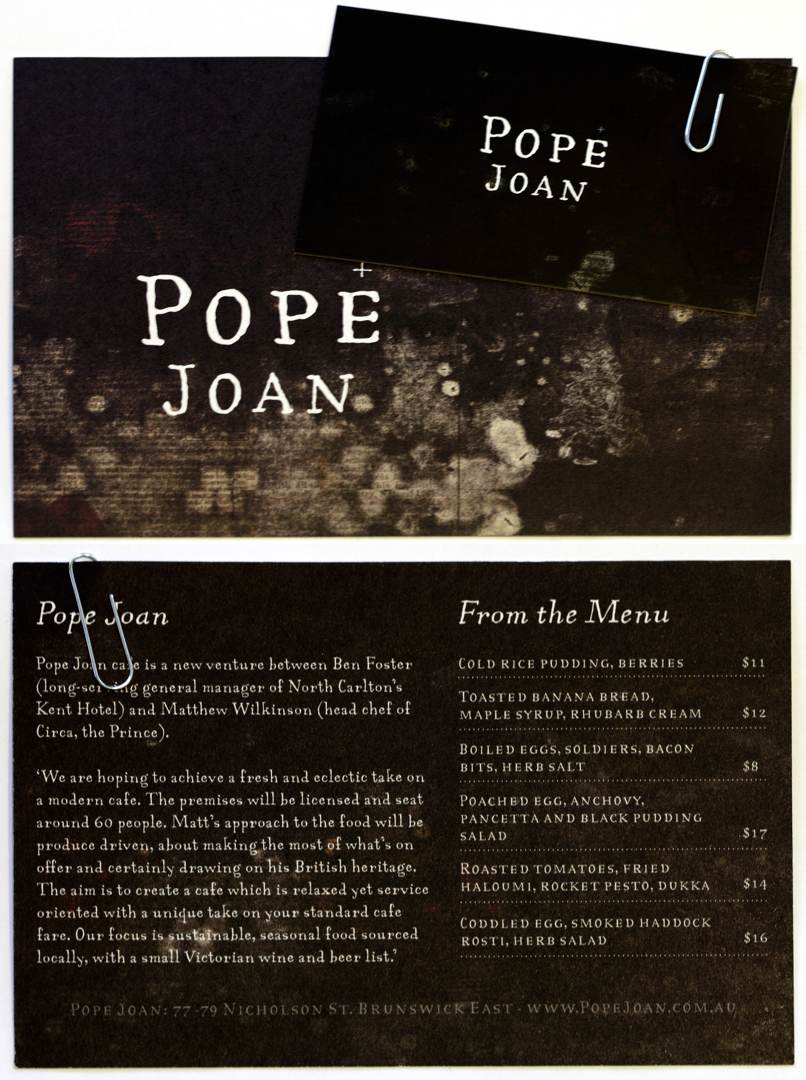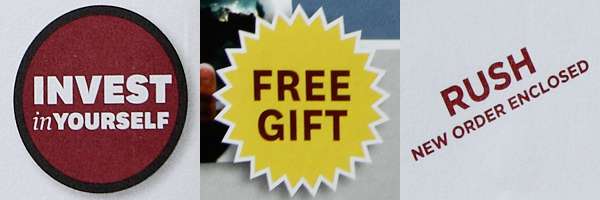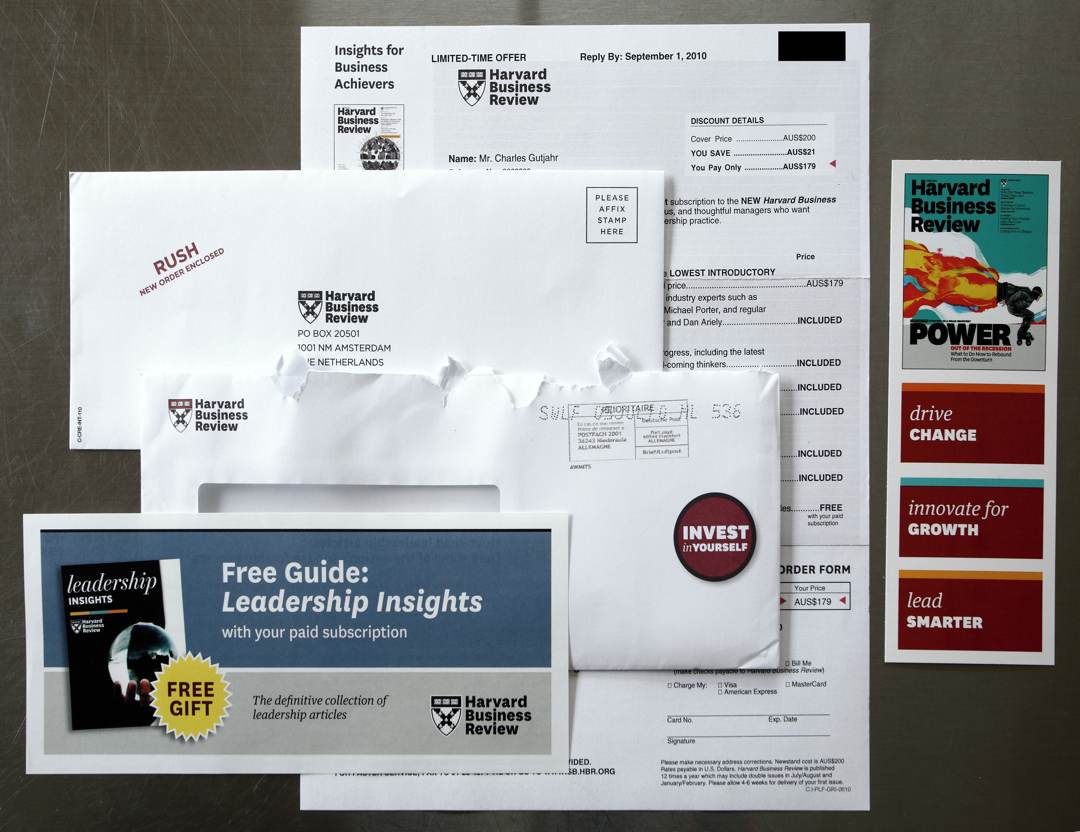
Charles Gutjahr
What Pope Joan could teach the Harvard Business Review
A few days ago I opened my letterbox to find two items. One was a postcard promoting a new local cafe called Pope Joan, the other was a letter promoting the Harvard Business Review. I rather liked the Pope Joan postcard, it's an example of a good advertisement and it got me interested in the cafe. But I hated the Harvard Business Review promotion, in fact I disliked it so much that I've lost all respect for the Harvard Business Review. So why is it that a small local cafe can do such a better job than a giant, world-renown business magazine?
Pope Joan
First up, let's look why I liked the Pope Joan promotion. Its first impression is good; it is printed on nice card and looks interesting without being overdesigned. Turn it over and I see two critical things that get my vote of approval:

- Its purpose is clear. The headings are 'Pope Joan' and 'From the Menu'. Without reading more than five words, I know that this postcard is promoting a restaurant or cafe called Pope Joan. The first words in the body text are 'Pope Joan cafe is a new venture'. So now I know that they've sent me this because they've just opened, and they want people to know about it. It took me no more than three seconds to understand why I received this postcard.
- It is short and to the point. The postcard gives me enough information to get me interested, and no more. It illustrates what the owners are trying to achieve with their cafe, as well as giving practical information. Yet the two paragraphs of text are little more than 100 words. The menu on the right is just a sample with six items — enough to give me a good impression of the kind of food they serve.
Together these things mean that Pope Joan isn't wasting my time. This postcard justifies itself turning up in my letterbox because Pope Joan is new and so I probably don't know about it yet, and it avoids overstaying its welcome by keeping things short. The overall result is that I like it and want to visit Pope Joan.
I also like that it doesn't boast. It uses phrases 'hoping to achieve', 'the aim is to' and 'our focus is'. It doesn't claim to be perfect, but it makes it clear that they're trying.
Harvard Business Review
The first thing I notice about the Harvard Business Review letter is the badge printed on the envelop saying 'Invest in yourself'. It looks tacky... it reminds me of the get-rich-quick scheme letters I get occasionally, and the use of three fonts in three words is aesthetically tacky too. It is not a good start.

Open up the envelope and out falls three fliers. Where do I start? The Pope Joan postcard makes its purpose clear, but the Harvard Business Review has a bunch of unrelated things and I don't know why I've received it. "Don't Miss What's Coming in HBR", "Free Guide: Leadership Insights", "Limited-time Offer", "Executive Benefits Summary", "Invest in Yourself", there is no clear message here.
The first flier I look at annoys me because it says "Must-read leadership articles from some of the nation's top leadership experts". I hate the term 'must-read' because it presumes that the advertiser knows more that me, that I am wrong because I haven't read it. In contrast Pope Joan doesn't tell me to do anything, it tells me what Pope Joan is doing to attract my business. Pope Joan doesn't assume anything about me, and doesn't make wild 'must-visit' claims.

The second part of HBR's headline says "some of the nation's top leadership experts". This makes me pause: which nation are they talking about? I'm Australian so my nation is Australia... but I'm pretty sure that HBR isn't Australian so it makes me wonder what they mean. I look at the envelope and it's sent from ALLEMAGNE — ie the French name for Germany. But the reply address isn't in France or Germany, it's in the Netherlands. Australia, France, Germany and the Netherlands are all possibilities. A Google search reveals that the Harvard Business Review is in fact from the USA, something that isn't mentioned anywhere on the five pieces of paper they sent me. Pope Joan proudly points out its local food and Victorian wine, whereas the Harvard Business Review presumptuously assumes that I know where it comes from and what its magazine serves up.
By now I am completely distracted. Instead of considering their subscription offer, I'm sitting at the computer using Google to find out about them. Their boast about being a 'must-read' has already put me off, but I'm writing a blog about this stuff so I go back and read their advertisement again.
Next item to annoy me is "up to 53% savings off the newsstand price". I hate the term 'up to' because it often indicates unrealistic savings, or savings that I don't qualify for. That's exactly the case here because I don't qualify for 53% off the newsstand price, I only qualify for 10.5% off the newsstand price. That's less than a fifth of the advertised 'up to' savings! The letter states that the newsstand price is AU$200 and that my discounted price is AU$179. Presumably someone or somewhere else can get 53% off, but I can't. They've already printed my actual discount, so to promote a different figure — 53% off — is lazy of them, is annoying to me, and is potentially misleading.

Yet the Harvard Business Review had a bigger kick in the nuts waiting for me. The letter tells me that I am offered a "1 year subscription to HBR print edition at the LOWEST INTRODUCTORY rate". I've got Google open in front of me, so I search for 'Harvard Business Review subscription'. The first result is http://hbr.org/reprints-subscriptions and five seconds of clicking later I discover that the normal subscription price for the Harvard Business Review print edition is AU$165, not AU$179 and not AU$200. A few seconds effort has revealed a lower price than their 'lowest introductory rate'! So not only have they boasted about their product and insulted my intelligence, now they've effectively lied to me. Needless to say, I've lost all respect for the Harvard Business Review.
Market Segmentation
There is a URL printed at the bottom of the letter that explains what's gone wrong here. It seems they've segmented the market and put me in the 'executive' category who are prepared to pay more (it's probably because I often lie on marketing surveys and say I'm a CEO). The reason I assume this is that I found two subscription URLs:
- hbr.org/reprints-subscriptions — from Google, print subscription price is AU$165
- www.sb.hbr.org — printed on the letter, print subscription price is AU$179
To be fair, the second price does include a 'free' Leadership Insights booklet... but if it is truly free then it wouldn't cost another $14 more. To point is that the Harvard Business Review has engaged in market segmentation and my guess is that they're trying to get more money out of people they think are prepared to pay more. I think that's fair enough in principle, but I don't want to be the gimp who is paying more.
Pope Joan engages in a kind of market segmentation too, but it does it with more transparency and honesty than the Harvard Business Review. You can segment the food market into people who are after a cheap feed, and people who are after a quality meal. It's clear that Pope Joan after interested in the latter segment because they're selling a $17 salad. The Pope Joan price is plain to see, so — in contrast to HBR — it can't change depending on who you are. Charging different amounts of money for the same thing might be a valid strategy but it makes me uneasy... and I'll bet it makes lots of other people uneasy too.
In conclusion... the case study I'd like to see
The Harvard Business Review publishes case studies on business management, trying to inform people on how to do well in business. The irony here is that a little local business, Pope Joan, has done a much better job of promoting themselves to me than the well respected Harvard Business Review. So there's a case study I'd like to see: the Harvard Business Review studying why a little local business can do it so much better than they can.
